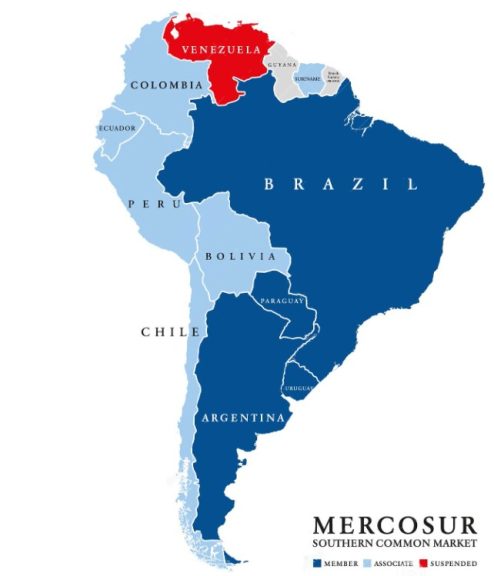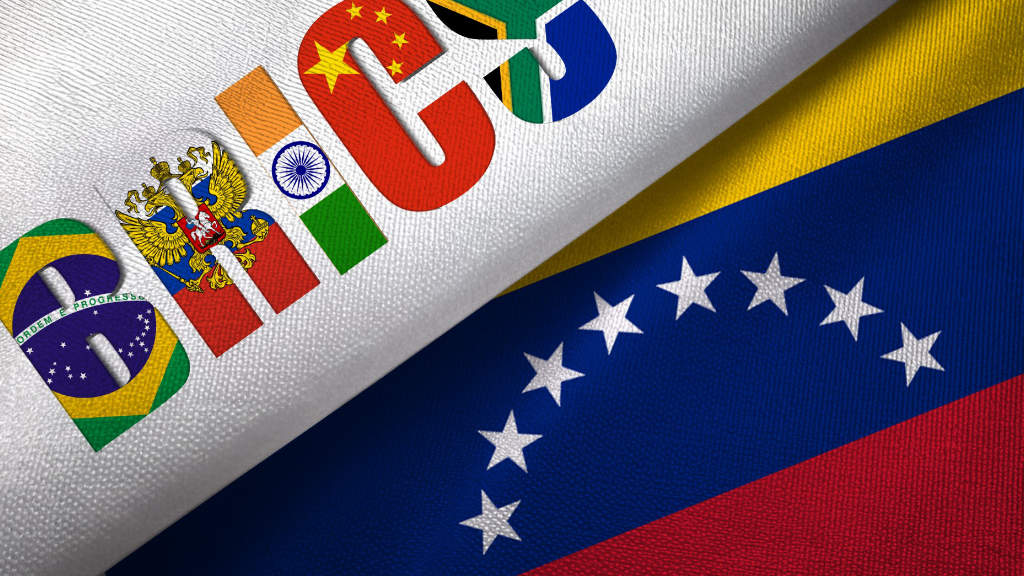Venezuela has been working hard to join BRICS as a full member, with Caracas well aware of the growing role of the group on the world stage and attaching great importance to Venezuela-BRICS cooperation. However, significant political and diplomatic barriers need to be overcome by Caracas if it is to succeed. Most of this lies in its current relations with Brazil, which also holds the BRICS Chairmanship for 2025. Yet Venezuela’s regional relations also need attention.
These disagreements initially began in 2016, when Venezuela was suspended from its membership of the Mercosur South American trade bloc, which Venezuela had originally joined in 2012. During that membership period, most of which was overseen by the current Venezuelan President Nicholas Maduro, Mercosur members Brazil, Argentina, Paraguay and Uruguay concluded that Venezuela had not incorporated key rules on trade and human rights into its national law as had been promised by the previous President, Hugo Chavez, who died in office in 2013.
Maduro stated at the time that there was conflict between Mercosur’s regulatory position and Venezuelan laws as concerns its sovereignty. The issue between Mercosur and Venezuela remains unresolved – the country is still suspended, nine years later, suggesting some intransience on the part of Caracas. It also seems a missed opportunity – Mercosur’s 2024 GDP (PPP) was some US$5.7 trillion, making it the world’s fifth largest economic bloc.
A secondary issue then blew up between Caracas and Brasilia following the presidential elections in Venezuela in July 2024. After 80% of the ballots were counted, Maduro won for the third time. Brazil and several other Latin American countries insisted on the publication of the results of the full ballot count, as well as the voting protocols for each polling station. This never happened, and Maduro took up another six-year term, despite criticism from the EU, the US and other neighbouring South American countries. The result has been that Brasilia continues not to recognise Maduro as the legitimate President of Venezuela. As a result, it has blocked Venezuela’s application to join the BRICS group.
To resolve these issues, Maduro personally flew to the October 2024 BRICS summit in Kazan, met with Vladimir Putin and took part in BRICS meetings. However, the President of Brazil, Luiz Inácio Lula da Silva scheduled to attend, was not physically present due to a serious injury hospitalising him a few days beforehand, leaving a Brazilian delegation only to participate. An anticipated Venezuela-Brazil Presidential side meeting never happened.
Putin subsequently clarified the position as regards Venezuela’s BRICS application, stating that “As for accepting Venezuela or any other state into BRICS, this is only possible by consensus. We have a rule: in order to accept any candidate into the BRICS association, the consent of all participants of this association is required. Without this, it is impossible to take such a step.”
As regards Maduros’ credentials, Moscow and Brasilia have differing opinions – Russia recognizes him as the official President of Venezuela, Brazil does not, although the Brazilian President Luiz Inacio Lula da Silva has stated that “It is normal for disagreements to arise. How are they resolved? By presenting the protocols. When the results are presented and their validity is confirmed, we will be obliged to recognize the results of the elections in Venezuela.”
Caracas meanwhile has expressed ‘outrage’ at Brasilia’s stance, which probably has done little to alleviate the situation.

Meanwhile, the BRICS member countries have different views on Venezuela’s potential entry. Moscow’s position has tended to be pro-Caracas, with Vladimir Putin said that he had discussed the situation with Lula da Silva, stating that Venezuela has been fighting for its independence and sovereignty and that Brasilia could perhaps provide some political leeway.
Russia-Venezuela
The Russian embassy in Venezuela says that the Russian-Venezuelan strategic partnership is developing in a wide range of areas. New initiatives to strengthen bilateral cooperation are in place, from nuclear energy, medicine, agriculture, military-technical cooperation and culture. Projects are being implemented in geological exploration for minerals, biosecurity, and the agricultural sector.
India-Venezuela
Venezuela is also actively building a political dialogue with India. Immediately after the BRICS summit, Venezuelan Vice President Delcy Rodriguez visited New Delhi. At the meeting, the parties discussed cooperation in the energy sector.
Iran-Venezuela
Venezuela has also been actively cooperating with Iran, with Tehran deploying a drone development base at the El Libertador air force base in Venezuela. It is also reported that Iran’s Mahan Air have been transporting gold from Caracas to Tehran, in exchange for which Iran supplied Venezuela with processed oil (Venezuela is oil rich but its product requires treatment).
China-Venezuela
In 2023, China was the largest source of imports to Venezuela, responsible for 40% of all Venezuelan imports. China was ahead of regional rivals Brazil (13%), Mexico, and Colombia, partially emphasizing the rift that Venezuela has in its own backyard.
South Africa, UAE and Venezuela
Apart from the Brazil issue, Venezuela has good relations with the other BRICS countries, as almost all recognize the current Maduro government. For example, the UAE were among the first to congratulate Maduro on his victory, while South Africa has also recognized Maduro’s legitimacy.
Venezuela, Sanctions and Resources
BRICS membership is important for Venezuela, as it would help reduce the impact of Western sanctions on its economy. In 2024, the Venezuelan inflation rate was 48%, although this was the lowest over the past decade. Cooperation with the BRICS would also allow Caracas to gain access to the resources of the New Development Bank.
In turn, Venezuela can provide its resources to other BRICS members. In August last year, Maduro stated that Venezuela could transfer the rights to develop Venezuelan oil and gas fields to BRICS members if the United States and its allies continued attempts to destabilize Venezuela’s political situation.
Venezuela has the largest oil reserves in the world – more than 300 billion barrels, and is also ranked eighth in the world in gas reserves. The country has impressive reserves of mineral resources (iron, aluminum, coal, gold, diamonds) and a developed agriculture – it grows corn, soybeans, sugar cane, rice, coffee, cocoa, vegetables and fruits.
Key to Venezuela’s fortunes however appear to be Brasilia, which for the time being is sticking to its guns. And key to that may also be Caracas making concessions to Mercosur – and that involves re-negotiating trade agreements with Argentina, Paraguay and Uruguay. Caracas may need to more strongly appreciate that it is not an entirely good look for Venezuela’s application to join BRICS when it cannot yet repair its regional relations.
Further Reading
Russia, Venezuela 2025 Foreign Relations: Update

 Русский
Русский













